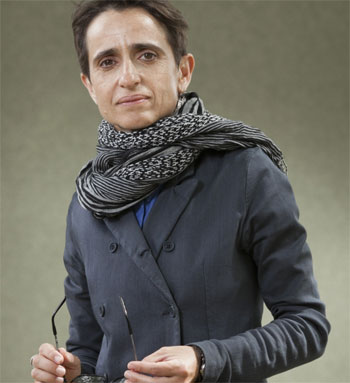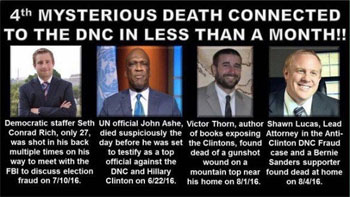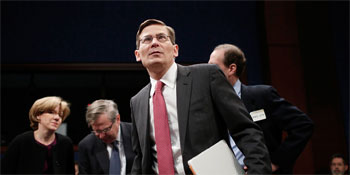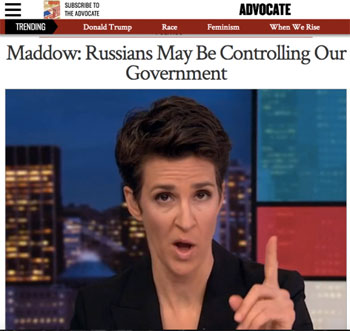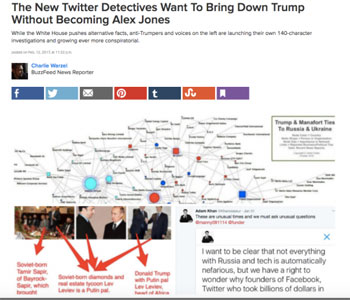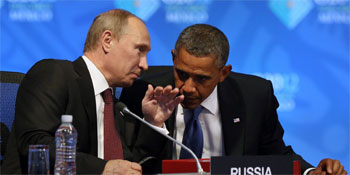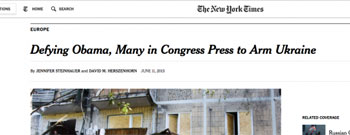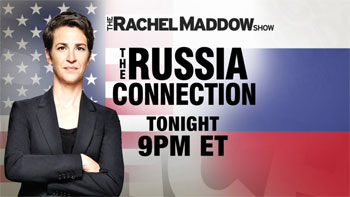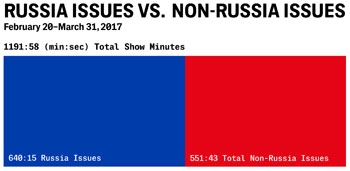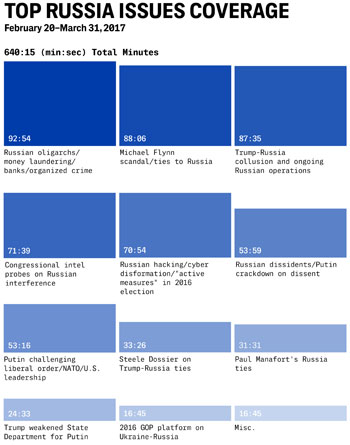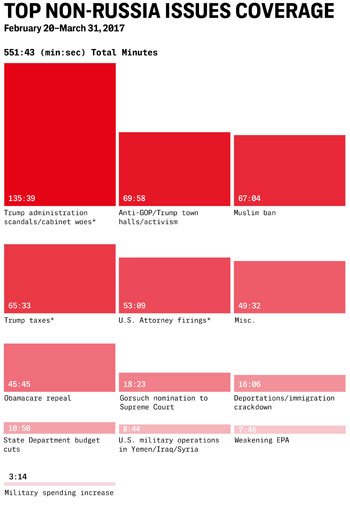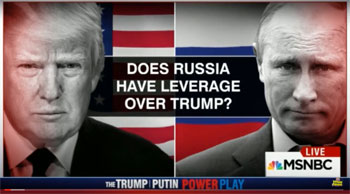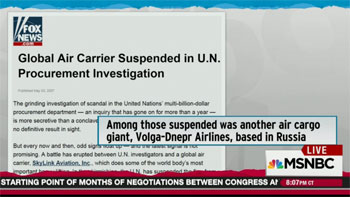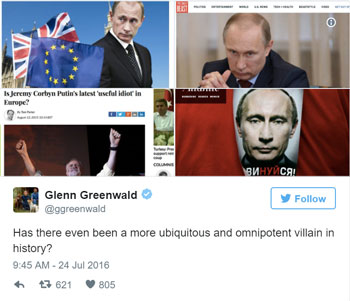by Glenn Greenwald
February 28, 2017
NOTICE: THIS WORK MAY BE PROTECTED BY COPYRIGHT
YOU ARE REQUIRED TO READ THE COPYRIGHT NOTICE AT THIS LINK BEFORE YOU READ THE FOLLOWING WORK, THAT IS AVAILABLE SOLELY FOR PRIVATE STUDY, SCHOLARSHIP OR RESEARCH PURSUANT TO 17 U.S.C. SECTION 107 AND 108. IN THE EVENT THAT THE LIBRARY DETERMINES THAT UNLAWFUL COPYING OF THIS WORK HAS OCCURRED, THE LIBRARY HAS THE RIGHT TO BLOCK THE I.P. ADDRESS AT WHICH THE UNLAWFUL COPYING APPEARED TO HAVE OCCURRED. THANK YOU FOR RESPECTING THE RIGHTS OF COPYRIGHT OWNERS.
THE NEW YORKER is aggressively touting its 13,000-word cover story on Russia and Trump that was bylined by three writers, including the magazine’s editor-in-chief, David Remnick. Beginning with its cover image menacingly featuring Putin, Trump, and the magazine’s title in Cyrillic letters, along with its lead cartoon dystopically depicting a UFO-like Red Square hovering over and phallically invading the White House, the article is largely devoted to what has now become standard — and very profitable — fare among East Coast newsmagazines: feeding Democrats the often xenophobic, hysterical Russophobia for which they have a seemingly insatiable craving. Democratic media outlets have thus predictably cheered this opus for exposing “Russian President Vladimir Putin’s influence on the presidential election.”
But featured within the article are several interesting, uncomfortable, and often-overlooked facts about Putin, Trump, and Democrats. Given that these points are made here by a liberal media organ that is vehemently anti-Trump, within an article dispensing what has become the conventional Democratic wisdom on Russia, it is well worth highlighting them:
1. Obama and Clinton have radically different views on Russia.
A major irony in the Democrats’ current obsession with depicting Putin as the world’s Grave Threat — and equating efforts to forge better relations with Moscow as some type of treason — is that it was Barack Obama who spent eight years accommodating the Russian leader and scorning the idea that Russia should be confronted and challenged. Indeed, Obama — after Russia annexed Crimea — rejected bipartisan demands to arm anti-Russian factions in Ukraine and actively sought a partnership with Putin to bomb Syria. And, of course, in 2012 — years after Russia invaded Georgia and numerous domestic dissidents and journalists were imprisoned or killed — the Obama-led Democrats mercilessly mocked Mitt Romney as an obsolete, ignorant Cold War relic for his arguments about the threat posed by the Kremlin.
Hillary Clinton, however, had a much different view of all this. She was often critical of Obama’s refusal to pursue aggression and belligerence in his foreign policy, particularly in Syria, where she and her closest allies wanted to impose a no-fly zone, be more active in facilitating regime change, and risk confrontation with Russia there. The New Yorker article describes the plight of Evelyn Farkas, the Obama Pentagon’s senior Russia adviser who became extremely frustrated by Obama’s refusal to stand up to Putin over Ukraine but was so relieved to learn that Clinton, as president, would do so:
The Administration believed, with considerable justification, that escalating the conflict would provoke retaliation from Russia, push Putin into a corner, and -- since Putin would never let the rebels suffer a battlefield defeat -- prove costly for Ukraine. But Farkas disagreed: "We just ignore everything the Russians do in Ukraine because, well, that's Ukraine and the stakes are so high for Russia there. They wouldn't risk it in the U.S." Finally, she gave up trying to convince Obama. "I was so done," she said. "I was so tired of fighting." She resigned in October, 2015, and eventually became a foreign-policy adviser to Hillary Clinton, who had sometimes favored the use of military force when Obama did not. "The crazy thing was, when I joined the Clinton campaign, I was, like, Great, I'm not going to have to fight anymore, because she got it on Russia," Farkas said. "Then it just got worse."
The Russian experts heralded by the article also feared that Clinton — in contrast to Obama — was so eager for escalated U.S. military action in Syria to remove Assad that a military conflict with Russia was a real possibility:
Some in Moscow are alarmed, too. Dmitry Trenin, a well-connected political and military analyst for the Carnegie Moscow Center, said that in early fall, before Trump's victory, "we were on a course for a 'kinetic' collision in Syria." He said that the Kremlin expected that, if Clinton won, she would take military action in Syria, perhaps establishing no-fly zones, provoking the rebels to shoot down Russian aircraft, "and getting the Russians to feel it was Afghanistan revisited." He added, "Then my imagination just left me."
It’s impossible to overstate how serious of a risk this was. Recall that one of Clinton’s most vocal surrogates, former acting CIA chief Michael Morell, explicitly said — in a Dr. Strangelove-level creepy video — that he wanted to kill not only Iranians and Syrians but also Russians in Syria:
[Michael Morell, Former Director of CIA] I'd give them the things that they need to both go after the Assad government, but also to have the Iranians and the Russians pay a price. Right? When we were in Iraq, the Iranians were giving weapons to the Shia militia who were killing American soldiers, right? The Iranians were making us pay a price. We need to make the Iranians pay a price in Syria. We need to make the Russians pay a price.
[Charlie Rose] We make them pay a price by killing Russians and Iranians?
[Michael Morell, Former Director of CIA] Yes, yes. Covertly. You don't tell the world about it, right? You don't stand up at the Pentagon and say, "We did this." But you make sure they know it in Moscow and Tehran. Here's the thing I want to do. I want to go after those things that Assad sees as his personal power base. Right? I want to scare Assad. I want to go after his presidential guard. I want to bomb his offices in the middle of the night.
[Charlie Rose] Well, that happened about two years ago, as you may remember, when his brother-in-law ...
[Michael Morell, Former Director of CIA] I want to destroy his presidential aircraft on the ground. I want to destroy his presidential helicopters. I want to make him think we're coming after him. Right? I'm not advocating assassinating him. I'm not advocating that. I'm advocating going after what he thinks is his power base, right, and what he needs to survive. I want him to think that "this is not going to end well for me." I want to put pressure on him; I want to put pressure on the Iranians; I want to put pressure on the Russians; to come to that diplomatic settlement.
There’s a reason that those who were so eager for U.S. military intervention in both Syria and Ukraine were so passionately supportive of Clinton. They knew there was a high likelihood that she would do what Obama refused to do: risk war with Russia in pursuit of these foreign policy goals.
One can, of course, side with the Clinton wing on the ground that the U.S. has been too soft on Russia, but what should not be suppressed — and what the New Yorker article makes clear — is that the hawkish views on Russia now dominant (even obligatory) in the Democratic Party were exactly what Obama resisted up until the day he left office.
That’s why people like John McCain, Lindsey Graham, and Marco Rubio, along with various neocon organs, relentlessly attacked Obama on the ground that he was too accommodating of Putin in Syria, Ukraine, and beyond. The post-election Democratic Party orthodoxy on Russia has deliberately obscured the fact that the leading accommodationist of Putin was named Barack Obama, and in that, he had a radically different approach than Clinton advocated.
2. The risk of a new Cold War is very real and very dangerous.
The most astonishing aspect of the post-election discourse on Russia is how little attention is paid to the risks of fueling a new Cold War, let alone of military confrontation between the two nuclear-armed powers. A different New Yorker article in December, by Eric Schlosser, described how many times the two countries came quite close to nuclear annihilation in the past, and how easy it is now to trigger a nuclear exchange merely by miscommunication or misperception, let alone active belligerence:
.Today, the odds of a nuclear war being started by mistake are low — and yet the risk is growing, as the United States and Russia drift toward a new cold war. … The harsh rhetoric on both sides increases the danger of miscalculations and mistakes, as do other factors. Close encounters between the military aircraft of the United States and Russia have become routine, creating the potential for an unintended conflict
Constantly ratcheting up aggressive rhetoric and tension between Washington and Moscow is not a game. And yet it’s one that establishment Democrats — and their new allies in the war-loving wing of the GOP — are playing with reckless abandon, and with little to no apparent concern about the risks. They have re-created a climate in the U.S. where a desire for better relations with Russia triggers suspicions about one’s loyalties.
The New Yorker article is rife with warnings about how close the two countries are to returning to full-blown Cold War animosity, with all the costs and horrors the prior one entailed. This harrowing passage is typical:
Not in a generation has the enmity run this deep, according to Sergey Rogov, the academic director of the Institute for U.S. and Canadian Studies, in Moscow. "I spent many years in the trenches of the first cold War, and I don't want to die in the trenches of the second," Rogov said. "We are back to 1983, and I don't enjoy being thirty-four years younger in this way. It's frightening."
Some old foreign policy hands in the Clinton circle believe the U.S. and Russia are already in a second Cold War and are angry that Trump is not doing enough to win it (and, even though they are loath to say it, they believed the same about Obama):
Strobe Talbott, the former Clinton adviser, said, "There is a very real danger not only that we are going to lose a second Cold War -- or have a redo and lose -- but that the loss will be largely because of a perverse pal-ship, the almost unfathomable respect that Trump has for Putin."
There are, as usual, numerous highly influential factions in Washington that would stand to benefit enormously from the resurrection of the Cold War. They’re the same groups that benefited so much the first time around: weapons manufacturers, the think tanks they fund, the public/private axis of the Pentagon and intelligence community, etc. And the people who exert the greatest influence over U.S. discourse continue to be the spokespeople for those very interests. When all of that is combined with the Democratic Party’s massive self-interest in inflating the Russia threat — it gives them a way to explain away their crushing 2016 defeat — it is completely unsurprising that the orthodoxy on Russia has become hawkish and pro-confrontation.
One can debate whose fault it is that the two nations are so close to re-starting the Cold War. A primary obligation of Good Patriotism is to insist that it’s always the other side’s fault. But for those who would like to hear the other side of this equation, as a tonic to the singular message of the U.S. Patriotic Media, here’s Noam Chomsky speaking last year to German journalist Tilo Jung:
Jung & Naiv: Interview with Noam Chomsky
By Tilo Jung
Episode 284
October 23, 2016
…
[Noam Chomsky] Americans might not know this, but there are polls carried out by major American polling companies -- not our enemies -- like Gallup polls, and one of the questions they ask is “Which country is the greatest threat to world peace?” And the United States is way ahead; nobody else is even close. This does not get reported in the United States. People don’t know about it.
[Jung & Naiv] Is it true?
[Noam Chomsky] Is it true? That’s what most people in the world think.
[Jung & Naiv] Do you think it?
[Noam Chomsky] Well, there’s good reason to believe it. We don’t like to look at it that way …
[Jung & Naiv] We’re the good guys.
[Noam Chomsky] Not the West, but the United States. But every other great power has also thought of itself as the good guy. It was true of Britain when it was running the world; it was true of France when it was a dominant power; it was true of Hitler’s Germany; it was true of fascist Japan; in fact, it’s kind of a universal. Every state that has any degree of power regards itself as uniquely admirable or magnificent, and doesn’t understand why the rest of the world doesn’t perceive our angelic character. That’s a historical universal. Probably that was true of Genghis Khan and other world wreckers.
…
[Jung & Naiv] Let’s stick to the alien perspective. Global warming and the nuclear age still has to be resolved. We have to fix those problems. If we don’t fix them, will the 21st century be the final, last century of humanity?
[Noam Chomsky] Probably not of humanity, but of organized human life on earth. So, for example, if there’s a nuclear war, which has come very close many times, sometimes by pure accident -- I could give some examples which are harrowing -- but sometimes by pure reckless actions. This is now increasing. The leading mainstream specialists, nuclear strategists, people like William Perry, former defense secretary, argue that the threat of nuclear war today is greater than it was during the cold war. And others agree.
And there’s a journal called The Bulletin of the Atomic Scientists. It’s the major journal of atomic scientists. It opened right at the beginning of the nuclear age. In 1947, two years after the atomic bombing, they established what they call a Doomsday clock, a clock with a minute hand. And the question is, “How far is the minute hand from midnight?” Midnight meaning termination; we’re done! Every year they collect a group of specialists, experts, to try and set the minute hand. Two years ago they moved it two minutes closer to midnight. Now, three minutes to midnight, which is as close as it’s been since the early 1980s when there was a major war scare, when we almost came to war. So it’s not just William Perry. Plenty of others.
Incidentally, when they moved it to midnight, it was not just because of the threat of nuclear war, it was also because of the failure of government to deal with the increasing threat of environmental catastrophe. And it’s serious.
So just take one element: rise in sea levels. That’s not in question any longer. Sea levels are rising. In fact, faster than they have in recorded history.
Just consider a country like Bangladesh. It’s a low-lying coastal plain. It has hundreds of millions of people. As the sea level rises slightly, those people are going to have to flee. Now the chief environmental scientist of Bangladesh recently warned that tens of millions of people are going to have to flee in the coming years just from sea level rise. And he made an interesting comment. He said that if we lived in a just world, these people would be admitted into the rich countries -- the United States, England, and others -- because those are the countries that are responsible for it, and have the capacity to absorb them. If we think we have an immigrant crisis today, which is non-existent, what’s it going to be like when tens of millions of people are fleeing from rising sea levels? And that’s just the beginning.
Just keeping to South Asia, the water supply from South Asia comes mostly from glaciers in the Himalaya mountains. They are melting. What happens when they disappear? They are melting pretty fast. There goes the water supply for south Asia, for a couple of billion people. In India alone, right now, there are already about an estimated 300 million people who barely have access to water. What’s going to happen then? It’s all over the place. Our coastal cities are going to disappear. And the extreme weather events will increase.
Right now about one person per second is fleeing from the effects of severe weather. That’s more than the number of refugees. And that’s going to increase. We’re facing a major disaster unless something’s done.
Now this alien who is watching us would be astonished not just at the fact that it’s not being discussed, but the fact that in the richest and most powerful country in world history, that is going to shape what happens in the future, there’s a major political party, the one that happens to dominate Congress right now, which simply denies that it’s happening. They have a policy about global warming: “Forget about it; it’s not happening!” Okay? It’s hard to find words to describe this. It means that in the most powerful country in world history, the most educated, with major advantages, a major political party is saying, “Let’s race to the precipice as quickly as possible.” And there’s no comment on it. Try to find a comment on that fact. I mean, what it really means is that this is the most dangerous organization in world history.
[Jung & Naiv] The Republican party?
[Noam Chomsky] Look, is that an exaggeration? In the Republican party, every single candidate said, “It’s not happening,” with one exception: John Kasich who is supposed to be the sensible moderate. He said, “Yes, it’s happening, but we shouldn’t do anything about it.” Which is worse. That’s 100% refusal, okay? One candidate say’s it’s happening, and we should make it worse. We should use more fossil fuels, including coal, which is the most polluting; we should eliminate environmental regulations; we should refuse to help poorer countries move to sustainable energy, as was agreed in the Paris negotiations last year, which they want to dismantle. So in other words, lets race to the precipice as quickly as possible.
Meanwhile, the threat of nuclear war is increasing, with very provocative actions on both sides. You know, specialists are concerned, but it’s not part of the general conversation. It’s not what you talk about with your friends when you go out for a cup of coffee.
[Jung & Naiv] It’s a depressing topic. But maybe the alien would agree that ignorance is bliss?
[Noam Chomsky] For a short time. Until it hits. And it’s not bliss for other people. It’s not bliss for the one person per second who is fleeing the effects of severe weather, drought, and so on. And these droughts – which are all over the place – are already having a big effect. So the catastrophe in Darfur, and what’s happening now in Syria is horrible, are to a significant extent the result of severe droughts. So take Syria. Awful things are happening. I mean, people have been killed; millions of refugees; the country is being destroyed. Part of the reason is that for several years before the conflict broke out, there was a very severe drought in Syria. Syria has been settled for thousands of years; it’s the heart of human civilization. And there’s never been anything like it in all of history. A huge drought drove peasants off the land. They couldn’t farm. Drove them into cities, which means densely populated urban slums, and lots of tension and conflict. All of that is kind of dry kindling. Drop a match on it and it explodes. It sets up the basis for conflict.
In Darfur, where there was a huge catastrophe for a couple of years, and still continuing. Part of the reason is that huge droughts had driven nomadic populations into agricultural settled areas in order to survive, which set up, of course, a conflict. There was an invasion of people trying to survive. It’s not pleasant. That’s a large part of the basis for what happened there. And there’s going to be more and more of it.
We’re going to have water wars, because water is scarce, and not preserved. Ignorance is bliss if you can get yourself away from it and not think about the near future, like the future of your children, you see? It’s not far off.
[Jung & Naiv] Do you want to talk about the American empire? Martin Luther King famously said, “The greatest purveyor of violence in the world today is my own government.” I mean, he meant the American government. He said that 50 years ago. Is that still true?
[Noam Chomskjy] He said it at the peak of the Vietnam war, where American B52 bombers were carrying out saturation bombing in the densely populated Mekong Delta. Millions of people were killed; the country devastated. About the time that he spoke, one of the leading specialists on Indochina, Bernard Fall, a Vietnam military historian, who was by no means on the left -- he was strongly in favor of the U.S. backed Saigon government -- but he nevertheless pointed out that, as he put it, “Vietnam as a historical cultural entity may not survive the greatest onslaught against the population in an area this size in human history.” That’s when Martin Luther King spoke. Has it changed? Not much.
In 2003, the United States, along with Britain, invaded Iraq; killed hundreds of thousands of people; generated millions of refugees; committed all kinds of atrocities, torture and so on; instigated sectarian conflict – there is a major split in the Islamic world back to the 8th century which has been pretty amicable, just like Protestant/Catholic -- not during the period of the great wars, but during the peaceful periods -- and in Iraq, there was Shia and Sunni. But they intermingled, intermarried, lived in the same area, and a lot of times people didn’t know who was who. One of the effects of the American invasion, an almost immediate effect, was to begin to instigate a sectarian conflict, which is now tearing Iraq apart, and is tearing the region apart. It’s having a devastating effect. And we can go on. That’s not the only case.
…
[Jung & Naiv] You called Obama’s drone assassination program the by far greatest terrorist campaign in the world. Does that mean that Obama is a terrorist?
[Noam Chomsky] Well, let’s just go back to that alien. Suppose that he thought for a few minutes and asked himself, “How would people in Germany be reacting if say Iran has a program in which they sent assassins around the world to murder people who were threatening Iran, like for example the editors of the New York Times and Washington Post, the major newspapers who run articles saying ‘We should bomb Iran right now and not wait.’ Big articles?” So suppose they say, “Look, they are threatening us really seriously; they are claiming they are going to destroy us; and there are plenty of others including President Obama who says that ‘All options are open,’ meaning, including nuclear war; if Iran doesn’t do what we want we’ll get rid of them.” And there are plenty of people in Germany who are saying similar things. So how would young people in Germany react to those actions? Would they call that “terrorism”?
[Jung & Naiv] I would.
[Noam Chomsky] I think so. That’s what we’re doing. The drone program is a program initiated from the White House, with careful planning. They meet Tuesday morning, decide who is on the kill list today, and kill people who are suspected of planning to harm the United States. Is that any different than killing the editors of the Washington Post and New York Times because, not only are they suspected, but in fact they publish articles saying “Let’s bomb Iran right now.”
[Jung & Naiv] So Obama is a terrorist?
[Noam Chomsky] Ask yourself how the alien would look at it. And he’s a neutral observer. He or she, we didn’t decide. Aliens are usually “he”, so how would he look at it?
[Jung & Naiv] And since Germany is part of the drone program, Ramstein is the relay station for the drones, are we also terrorists?
[Noam Chomsky] Sure. And not just that, you’re torturers. Germany was involved in the rendition program, which is the worst kind of torture. The most depraved form, and the most cowardly form of torture is to take suspects and send them to terrorist countries where you know they are going to be tortured. That’s the peak. So you send them to Syria or Libya under Gaddafi. That way you can make sure that they are tortured.
There was a study done recently of the countries who participated in the rendition program: practically all of Europe, and the Middle east, of course, because that’s where the suspects were sent to be tortured by dictators. In fact, about the only part of the world who didn’t participate was South America, Latin America. They refused, which is kind of interesting for a number of reasons. Number 1 because they refused; and number 2 because not many years ago Latin America was the center of global torture during the period of the U.S.-backed, U.S.-installed dictatorships of the 60s, 70s and 80s. First Brazil, and then Chile under Pinochet, and then Argentina which was the worst of all, and others like Uruguay. There was horrible torture all over the place not very long ago. But enough of a change has taken place that Latin America virtually alone didn’t participate in the most depraved, cowardly, disgusting form of torture: rendition. But Europe did!
…
[Jung & Naiv] Do you think it’s going to be the last empire?
[Noam Chomsky] An alien looking at it would probably conclude that it’s quite likely that in another century human society will have disintegrated because it’s not trying to deal seriously with the immense problems it’s facing. I mentioned two, which are enormous, but there’s more than that. Another major problem is the threat of pandemics, diseases that can’t be controlled. That’s already happening. And it’s happening for important reasons. One major reason, which we haven’t mentioned, but the alien would notice, is industrial meat production. Industrial meat production is a huge contributor to global warming, an enormous producer of carbon dioxide, methane, and other gases. But it also has another feature. Corporations pour antibiotics into these systems. Animals are crowded together in horrible conditions, and to prevent disease and maintain growth there is an extensive use of antibiotics. An enormous part of the whole antibiotic production is for this. Use of antibiotics leads to mutations which make bacteria antibiotic-resistant. The rate of antibiotic-resistant bacteria is growing faster than the techniques for dealing with it. So we may be destroying ourselves in that way too. There are a lot of things the alien would notice that we should be noticing.
[Jung & Naiv] So are you a vegan?
[Noam Chomsky] No, I’m not, but you can imagine that one would be. The crucial question in my view is not – I mean, individual actions are good, use less energy and so on -- but what’s really needed is collective action to deal with the roots of the problem. I mean, if you’re a vegan, let’s say, and you eat fruits and vegetables that are transported from somewhere else, you’re contributing to the destruction of the environment. That’s what transport is. There are a lot of things to look at. We all make individual compromises. There’s no choice. You can’t avoid it. Like we’ve got the lights on. We’ve got the electricity running. But the crucial question is really institutional. How are we going to deal with the fundamental institutions that are creating this?
[Jung & Naiv] Tell us.
[Noam Chomsky] Well, the only way that’s ever been discovered: organized collective action, which has led to a lot of changes. Take Germany. It’s not the same country it was 70 or 80 years ago. Why? Germans made it a different country. We can do the same.
Take say global warming. Germany is pretty advanced among countries in the world in trying to do something about it. That’s because Germans committed themselves to doing something. We can do the same on the other issues.
…
Take for example the threat of nuclear war on the Russian border. Take note that it’s on the Russian border, not the Mexican border. Now, that’s a reflection of global power. Now there’s provocations on both sides. And Germany is right there at the center of it. The major issue had to do with Germany.
If you go back to 1991, the end of the Soviet empire, there was a question as to how the world system would be reconstructed with the Soviet system collapsing. There were two views. Gorbachev, the Russian leader, proposed that vision of a unified security system for all of Eurasia, with no military blocks, just cooperative integration. That was one vision. The Americans, under President George Bush I and his secretary of state James Baker, had a different vision: The Russian system would collapse, and NATO would expand. The crucial question was Germany. For Russia, it was a pretty serious question. Germany alone had practically destroyed Russia twice during the preceding century, and there were other western invasions in western Europe. So Germany was going to be a serious question. Gorbachev agreed to allow Germany to be unified, east and west, even to join NATO, a hostile military alliance, which was quite a concession. But there was an agreement – he thought. The agreement was that NATO would not expand one inch to the East. That was the phrase that was used, which meant East Germany. NATO immediately expanded to East Germany. When Gorbachev protested the Americans pointed out, correctly, that it wasn’t a written agreement; it was just a verbal agreement, like a handshake. So if you trust us it’s kind of your problem. So NATO expanded to East Germany, and under the following years, under Clinton, it expanded to the former Russian empire and all the way to the borders of Russia. In 2008, and again in 2013 under Obama, NATO offered admission to NATO to Ukraine. Take a look at the map and history of Ukraine. It’s right in the geopolitical strategic heartland of Russia, apart from long historical other connections. Offering Ukraine NATO membership is a very serious threat to Russia. Western analysts understand that.
Right now, the United States – Obama – is putting what’s called a missile defense system in Romania. The pretense is that it is to protect Europe from non-existent Iranian missiles. Okay? If you can believe that, you can believe in Alice in Wonderland. It’s of course aimed against Russia, obviously.
And furthermore, it’s understood by strategic analysts on all sides, that what’s called “missile defense” is an offensive weapon. Nobody believes that missile defense could ever defeat a first strike. But it’s imaginable that it could deter a retaliatory strike, which means it’s a first strike weapon. And everyone understands that. It’s highly provocative.
And the Russians are carrying out a major military buildup of their own, modernizing forces, new missile systems, nuclear submarines with nuclear weapons and so forth.
And you have constant threats right at the border, planes on both sides sort of buzzing each other and so on. It could blow up. Germany is sitting right there. Germany could play a leading role in trying to reduce these tensions. And in fact, some German political leaders have called for that. These are choices, and they are choices that the German people have to make. Do we want to have a nuclear war and destroy everything? Do we want to wipe out the world with global catastrophe? That’s for people to decide.
But regardless of where one wants to pin blame for these heightened tensions, the risks of heightening them further are incredibly high — one could plausibly say: incomparably high. Yet in the name of being “tough” on Putin, those risks are virtually never discussed, and anyone who attempts to raise them in the context of advocating better relations will almost instantly be accused of being a Kremlin stooge, or worse.
3. The U.S. media refuses to say if the U.S. interferes in Russia’s domestic politics.
U.S. media accounts often note that “Putin believes” that the U.S. government has repeatedly interfered in Russia’s political process. Given how often Putin publicly makes this claim, that’s hard to suppress. But what they almost never comment on is the rather significant question of whether Putin’s claims are true: Does the U.S., in fact, try to manipulate Russian politics the way Russia now stands accused of interfering in the U.S. election?
The New Yorker article demonstrates how steadfastly this question is ignored. Here’s a classic formulation of it:
Vladimir Putin, who is quick to accuse the West of hypocrisy, frequently points to this history. He sees a straight line from the West's support of the anti-Moscow "color revolutions," in Georgia, Kyrgyzstan, and Ukraine, which deposed corrupt, Soviet-era leaders, to its endorsement of the uprisings of the Arab Spring. Five years ago, he blamed Secretary of State Hillary Clinton for the anti-Kremlin protests in Moscow's Bolotnaya Square. "She set the tone for some of our actors in the country and gave the signal," Putin said. "They heard this and, with the support of the U.S. State Department, began active work." (No evidence was provided for the accusation.)
So, the New Yorker notes, Putin claims Clinton’s State Department supported and promoted anti-Kremlin protests during Russia’s parliamentary elections, yet offers no evidence. But is that true? Did that happen? As most media outlets typically do, the New Yorker simply does not say. Here’s another classic example from this genre:
Last September, at a G-20 summit, in China, Obama confronted Putin about the hacking, telling him to "cut it out," and, above all, to keep away from the balloting in November, or there would be "serious consequences." Putin neither denied nor confirmed the hacking efforts, but replied that the United States has long funded media outlets and civil-society groups that meddle in Russian affairs.
Is it true, as Putin claims, that the U.S., in fact, “has long funded media outlets and civil-society groups that meddle in Russian affairs”? Again, the article believes it’s significant enough to note that Putin claims this, but never bothers to tell its readers whether it is actually true, or even if evidence exists for it.
What makes this steadfast silence so bizarre is that there’s virtually no question that it is true. Some have noted the 1996 Time magazine cover boasting of how U.S. advisers helped the U.S.’ preferred candidate, Boris Yeltsin, win Russia’s presidency. And, of course, the U.S. has continually and repeatedly interfered in the domestic political processes, including democratic elections, of more countries than one can count.
But far more relevant, and more recent, are the very active efforts on the part of the U.S. government to alter Russian civic society more to its liking. Many of these efforts, needless to say, are covert, but many are not. Here’s the National Endowment for Democracy — funded by the U.S. Congress through the State Department — openly touting the dozens of Russian political groups it funds.
National Endowment for Democracy
Supporting freedom around the world
EURASIA
RUSSIA 2011
Autonomous Non-Profit Organization "Center for Social Projecting 'VOZROZHDENIYE"
$50,000
To increase the accountability of elected officials to their constituents and educate recently elected officials and those aspiring to public office in the fundamentals of effective and transparent governance. Vozrozhdeniye will conduct a total of 27 seminars for three groups in the north, south, and center of Pskov Oblast. Vozrozhdeniye will form small study groups in each geographic area, which will allow participants to develop strong regional networks to focus on specific local issues.
Center for International Private Enterprise
$162,829
To instill democratic values, promote civic leadership, encourage new entrepreneurs, and provide alternatives to radicalization among youth in the North Caucasus. The Vladlkavkaz Institute of Management will expand its training program on entrepreneurship, democracy, and civic involvement to reach a wider audience. VIM will also support the graduates through an alumni network and mentoring from the local business community.
Center for International Private Enterprise
$82,182
[size]To raise awareness of the importance of property rights and the institutions supporting property rights among stakeholders and policymakers. Under this project, CIPE and its partners in three regions will gather information on property market issues ranging from corruption to effective governance to rule of law[/size]that will serve as a roadmap for regional- and federal-level advocacy work planned in future phases of the project.
Foundation Independent Press Center
$60,005
To host press conferences, seminars and roundtables organized by Russian NGOs. These events provide Russian and foreign journalists with access to a variety of speakers on key political, economic and social issues. The Center focuses attention on important problems that are often ignored by Russia's state-controlled media, such as corruption, illegal actions by government officials, human rights violations, and critical reports about Russian politics.
In response to all this, one can offer the same cliché that is invoked when it’s pointed out after a terrorist attack that the U.S. has killed countless innocent people all over the world: It doesn’t matter because two wrongs don’t make a right. That may well be true, but just as it’s difficult to actually fight terrorism if one refuses to grapple with its causes or if one objects only when one’s own side is the victim but not the perpetrator, it’s very difficult to credibly object to — let alone prevent — other countries from interfering in U.S. politics if you make no effort to object to U.S. interference in theirs.
And at the very least, U.S. journalists who discuss Putin’s claims in this regard should not just summarize those claims but report on whether they are valid. The refusal to do so is as conspicuous as it is troubling.
Polyarchy, or what I alternatively refer to as "low-intensity democracy," is a structural feature of the new world order: it is a global political system corresponding to a global economy under the hegemony of a transnational elite which is the agent of transnational capital.
-- Promoting Polyarchy: Globalization, U.S. Intervention, and Hegemony, by William I. Robinson
4. The U.S. government still has provided no evidence of its theories about Russian hacking.
That Putin ordered Russian hacking of the DNC’s and John Podesta’s emails in order to help Trump win is now such consecrated orthodoxy that it’s barely acceptable in Decent Company to question it. But that obscures, by design, the rather important fact that the U.S. government, while repeatedly issuing new reports making these claims, has still never offered any actual evidence for them. Even the New Yorker article, which clearly views the theory as valid, acknowledges this fact:
In early January, two weeks before the Inauguration, James Clapper, the director of national intelligence, released a declassified report concluding that Putin had ordered an influence campaign to harm Clinton's election prospects, fortify Donald Trump's, and "undermine public faith in the U.S. democratic process." The declassified report provides more assertion than evidence. Intelligence officers say that this was necessary to protect their information-gathering methods.
Recall that even hardened Putin critics and Western journalists in Moscow were aghast at how evidence-free these government reports have been. The lack of evidence for these theories does not, of course, prove their falsity. But, given the stakes, it’s certainly worth keeping in mind.
And it further underscores the reasons why no conclusions should be reached absent a structured investigation with the evidence and findings made publicly available. Anonymous claims from agenda-driven, disinformation-dispensing intelligence community officials are about the least reliable way to form judgments about anything, let alone the nature of the threats posed by the governments they want Americans to view as their adversaries.
5. Fixating on Russia continues to be used to distract from systemic failures of U.S. elites.
Denouncing the autocratic abuses of foreign adversaries such as Putin has long been the go-to tactic to distract attention from the failures and evils of U.S. actions — including the unpleasant fact that support for the world’s worst despots has long been, and continues to be, a central precept of U.S. policy. Or, as then-Secretary of State Clinton put it in 2009 about the decades-ruling Egyptian tyrant: “I really consider President and Mrs. Mubarak to be friends of my family. So I hope to see him often here in Egypt and in the United States.”
That Putin abuses the civic freedoms of Russians plainly answers none of the policy debates over Russia, given how ready and eager the U.S. is to align with the planet’s worst monsters. It’s instead designed to encourage Americans to fix their gaze on bad acts by people thousands of miles away in order to obfuscate the corruption of their own society and savagery by their own leaders. In several places, the New Yorker article warns against exploiting and inflating claims about Putin as a means of ignoring that the real causes of America’s problems reside not in Moscow but at home:
Although the evidence for Russia's interference appears convincing, it is too easy to allow such an account to become the master narrative of Trump's ascent -- a way to explain the presence of a man who is so alien and discomforting to so much of the population by rendering him in some way foreign. In truth, he is a phenomenon of America's own making.
It is true that Putin is used to avoid confronting the fact that Trump is “a phenomenon of America’s own making.” It’s also true that he’s used to avoid confronting the fact that Trump is a byproduct of the extraordinary and systemic failure of the Democratic Party. As long as the Russia story enables pervasive avoidance of self-critique — one of the things humans least like to do — it will continue to resonate no matter its actual substance and value.
And this avoidance of self-examination extends to the West generally:
No reasonable analyst believes that Russia's active measures in the United States and Europe have been the dominant force behind the ascent of Trump and nationalist politicians in Europe. Resentment of the effects of globalization and deindustrialization are far more important factors.
As Even The New Yorker Admits™, the primary reason for Trump, for Brexit, and for growing right-wing über-nationalism throughout Europe is that prevailing neoliberal policies have destroyed the economic security and future of hundreds of millions of people, rendering them highly susceptible to scapegoating and desperate, in a nothing-to-lose sort of way, for any type of radical change, no matter how risky or harmful that change might be. But all of that gets to be ignored, all of the self-reckoning is avoided, as long we get ourselves to believe that some omnipotent foreign power is behind it all.
Using Russia — yet again — to whitewash our own sins and systemic failures is bad enough. Let’s just hope it doesn’t lead the two countries back into a protracted and devastating Cold War or, worse still, direct military confrontation. With tensions rising and rhetoric becoming harsher and more manipulative, both of those outcomes are more likely than they’ve been in many years.

